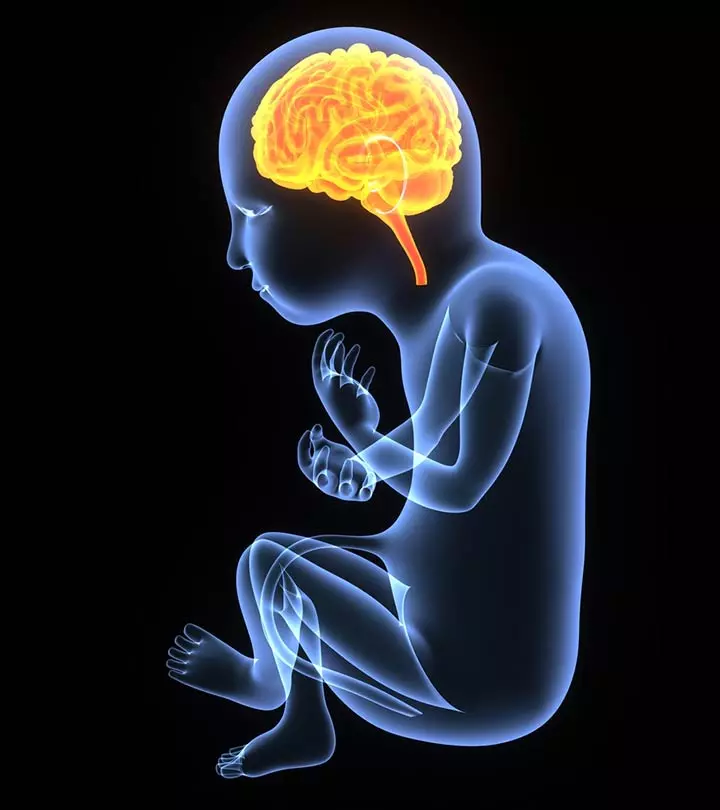

Image: Shutterstock

When you decide to start a family and learn that you are expecting, the wonderful adventure of pregnancy starts. However, this pregnancy might quickly become negative in some circumstances, such as a missed miscarriage. However, don’t give up hope; you can still experience pregnancy after missed miscarriage with the right precautions and procedures.
Continue reading to learn more about missed miscarriage, its causes, and preventive measures.
What Is Missed Abortion In Pregnancy?
A missed miscarriage can happen in any pregnancy. After conception, a fertilized egg implants in the uterus. Even before this phase, something may go wrong and the pregnancy discontinues.
- This might happen when the embryo fails to develop or when the sac is empty.
- This might also happen in cases when the embryo grows but fails to progress suddenly.
- As the mother is not able to realize if anything has gone wrong, this condition is known as a silent miscarriage (1).
As the mother is not able to realize if anything has gone wrong, this condition is known as a silent miscarriage.
Signs Of A Missed Miscarriage
Missed miscarriage is not accompanied by the normal signs of a miscarriage. Signs like heavy cramping, vaginal bleeding, or fetal tissue expulsion are missing from this kind of miscarriage.
Here are some signs that may be there (2) (3):
- Your placenta may still secrete hormones in a missed miscarriage. This in many cases continues the signs of pregnancy.
- Sometimes women claim that their discomforts like nausea, vomiting, tiredness, and breast tenderness have disappeared completely.
- You may experience brown vaginal discharges at times as well.
- Lack of fetal heartbeat is considered a sign of missed miscarriage. Ultrasounds performed will show underdevelopment of the fetus.
- Two measurements of β-HCG levels in 48 hours will ensure the missed miscarriage.
Why Does This Happen?
A missed miscarriage happens when something goes wrong in the early phase of pregnancy.
- It might be a result of the wrong number of chromosomes. It may be that one piece of chromosome is missing or duplicated. In this case, the genetic material that the chromosomes carries will not be suitable for the fetus inside (4).
- In later stages of pregnancy, this may happen because of infections like rubella or parvovirus. You may be asked to go for a blood test for herpes simplex virus (TORCH), cytomegalovirus, toxoplasmosis, or rubella if required. This diagnosis will help to look for infections (5).
- Thyroid problems, uncontrolled diabetes, thrombophilia or antiphospholipid syndrome, as well as uterus abnormalities may be responsible for the missed miscarriage.
If an ultrasound shows you had a missed miscarriage, you will be generally asked to go for a second ultrasound to confirm it.
What Happens After The Diagnosis?
When you eventually miscarry, you may want nature to take its own course. Some women also take the decision of undergoing a minor operation known as Evacuation of Retained Products of Conception (ERPC) to remove all pregnancy tissues from the uterus. If you allow the pregnancy tissues to remain in your uterus for long, it might increase chances of infection and heavy bleeding. In case bleeding is a concern, you may be recommended dilation and curettage (D&C) that helps removal of the tissues (6) (7).
- You will be administered general anesthesia before the operation.
- It is natural to feel anxious if you had a missed miscarriage and many reel under the constant fear if it happens again.
- It is recommended to wait for one period after a miscarriage before trying to get pregnant again (8).
- There is no need to hurry. You can always take time and make the right decision.
What About Future Pregnancy After Missed Miscarriage?
You can easily diagnose a missed abortion with the help of ultrasounds or β-HCG levels.
- This has helped women to protect their future pregnancies with the help of medical treatments.
- Regular ultrasounds ensure you do not suffer any further dangerous late abortions (9).
Women today enjoy their pregnancies like any other women after a missed miscarriage. So there is no need for you to despair and lose your faith. Follow the guidelines and treatment procedures your doctor suggests and stay positive. This may definitely improve the chances of pregnancy after missed abortion. You, with the help of your partner, can again look forward to a beautiful beginning.
Frequently Asked Questions
1. Can getting pregnant too soon after a miscarriage cause another miscarriage?
It may worry some women that getting pregnant too soon after a miscarriage may cause another miscarriage or complication because the uterus needs time to heal completely.
However, some studies show that women with uncomplicated and early miscarriages may become pregnant soon without the risk of another miscarriage or complication (10).
2. Is it easier to get pregnant after a miscarriage?
After one miscarriage, women have an 85% chance of having a healthy pregnancy, while after two or three miscarriages, women have a 75% chance (11).
A missed miscarriage might happen due to mishappenings occurring in the early conception stage. For instance, if you experience any signs such as cramping, heavy bleeding, brown vaginal discharge, or withdrawal of pregnancy symptoms, you may have a missed miscarriage. Although there could be many reasons for this phenomenon, if you plan for pregnancy after missed miscarriage, you may do so with the right guidance and precautions. It is essential to speak to a specialist about the procedures and safety measures to take before planning to get pregnant after a missed miscarriage.
References
- Carla Dugas and Valori H. Slane; 2025; Miscarriage.
https://www.ncbi.nlm.nih.gov/books/NBK532992/ - Missed Miscarriage.
https://www.miscarriageassociation.org.uk/information/miscarriage/missed-miscarriage/ . - Types of miscarriage.
https://www.pregnancybirthbaby.org.au/miscarriage - Early Pregnancy Loss.
https://www.acog.org/womens-health/faqs/early-pregnancy-loss - Sevi Giakoumelou et al.; (2016); The role of infection in miscarriage.
https://www.ncbi.nlm.nih.gov/pmc/articles/PMC4664130/ - Miscarriage
stillbirth and ectopic pregnancy. - Dilatation and curettage (D&C).
https://www.betterhealth.vic.gov.au/health/conditionsandtreatments/dilatation-and-curettage-dc - Trying again.
https://www.miscarriageassociation.org.uk/information/worried-about-pregnancy-loss/trying-again/ - Ultrasound pregnancy.
https://medlineplus.gov/ency/article/003778.htm - How Long After A Miscarriage To Try Again?
https://healthcare.utah.edu/the-scope/shows/0_iwnbqiad - Pregnancy After Miscarriage.
https://americanpregnancy.org/getting-pregnant/pregnancy-loss/pregnancy-after-miscarriage/
Community Experiences
Join the conversation and become a part of our nurturing community! Share your stories, experiences, and insights to connect with fellow parents.
Read full bio of Dr. Irene (Eirini) Orfanoudaki
Read full bio of shreeja pillai














